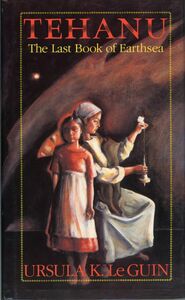Take a photo of a barcode or cover
There’s no high fantasy adventure to be had here. Our heroes stay put on the island of Gont for a cold drama of loss, grief, shame, and regrets. Our villains aren’t the elusive Dark Ones or a corrupt mage at the end of the world, but instead domineering misogynists and child rapists. We see Earthsea not from the vantage point of the lofty heroes in positions of power but from the powerless, oppressed, and embittered. Ged has returned from the hole in the world, having journeyed through Death itself on the behalf of Earthsea, magic-less and empty. The great Arch-Mage who slayed dragons and restored the Ring of Erreth-Akbe to Havana, has been reduced to a mumbling, forgetful, old man who lives in humiliation and fear. He and Tenar pensively search for what it means to be merely a man and merely a woman.
“Who are we? What is it to be a man?”
“She did not feel she understood his shame, his agony of humiliation. Perhaps only a man could feel so. A woman got used to shame.”
“Did she think by crossing the sea, by learning other languages, by being a man’s wife, a mother of children, by merely living her life, that she could ever be anything than what she was? Their servant. Their food. Theirs to use for their needs and games.”
Ursula throughly explores the mind of a righteously angry woman living in a society that relentlessly attempts to subdue her and those she protects. Some of this gender exploration seems influenced by Taoist conceptions of the feminine and masculine energies (as she has admitted the series to be heavily Taoist in influence). But at the core of that thought is that the energies are two sides of the same coin and that each person is, at essence, neither man nor woman, and can be seen on display here:
“Is it different then for me, than women?”
“What isn’t deary?”
“I don’t know. It seems to me we make up most of the differences and then complain about them.”
But most of all Ursula explores the hollow places inside of us that search for meaning and identity when all we thought was important is stripped away and beaten out of us. I appreciated seeing Earthsea from this lowly vantage point which painfully reflects, not fantasy, but reality.
“Who are we? What is it to be a man?”
“She did not feel she understood his shame, his agony of humiliation. Perhaps only a man could feel so. A woman got used to shame.”
“Did she think by crossing the sea, by learning other languages, by being a man’s wife, a mother of children, by merely living her life, that she could ever be anything than what she was? Their servant. Their food. Theirs to use for their needs and games.”
Ursula throughly explores the mind of a righteously angry woman living in a society that relentlessly attempts to subdue her and those she protects. Some of this gender exploration seems influenced by Taoist conceptions of the feminine and masculine energies (as she has admitted the series to be heavily Taoist in influence). But at the core of that thought is that the energies are two sides of the same coin and that each person is, at essence, neither man nor woman, and can be seen on display here:
“Is it different then for me, than women?”
“What isn’t deary?”
“I don’t know. It seems to me we make up most of the differences and then complain about them.”
But most of all Ursula explores the hollow places inside of us that search for meaning and identity when all we thought was important is stripped away and beaten out of us. I appreciated seeing Earthsea from this lowly vantage point which painfully reflects, not fantasy, but reality.
Fantastic story. For some reason, even with the lack of adventure, I've found this to be the best installment in the series, on par with the first book. Highly recommend.
Really great continuation, though it took a very different approach to Earthsea than we'd seen before and deals with some more mature themes than I expected from the series (violence, particularly against women and children).
It's definitely a story told by and about women, though, which was startling because of the heavily masculine characters from the previous books, but was definitely needed in order to paint the full picture of the world and continue one of my favorite characters stories, Tenar, who is just plucked off the narrative after The Tombs of Atuan, two books ago.
I debated whether or not to give it four stars because of some of the things in the book, like the violence, but I literally read this in like two days straight, and that isn't normal for me anymore. I'm taking that as a good sign
It's definitely a story told by and about women, though, which was startling because of the heavily masculine characters from the previous books, but was definitely needed in order to paint the full picture of the world and continue one of my favorite characters stories, Tenar, who is just plucked off the narrative after The Tombs of Atuan, two books ago.
I debated whether or not to give it four stars because of some of the things in the book, like the violence, but I literally read this in like two days straight, and that isn't normal for me anymore. I'm taking that as a good sign
It took me a bit to acclimate to how different this story is but once I did I think I appreciate it more. There is a heavy depth and exploration I’ve not seen in fantasy in this; steeped in a perspective never quite articulated and unkempt. There are many questions and little definitive answers and I enjoyed discovering Tehanu and Tenar.
Ged is more realized and more manly, truly growing up. Bow that he is “empty”, he can fill himself with something more substantial or substantive than this wizardly power that possessed his life. This is no “and then they lived happily ever after”, yet is some of that. Instead there is a joy in discovering the magic of being with and giving yourself to someone else, as well as the pleasure of a hard days work.
I may like it the most so far, as I make my way through all these stories.
Ged is more realized and more manly, truly growing up. Bow that he is “empty”, he can fill himself with something more substantial or substantive than this wizardly power that possessed his life. This is no “and then they lived happily ever after”, yet is some of that. Instead there is a joy in discovering the magic of being with and giving yourself to someone else, as well as the pleasure of a hard days work.
I may like it the most so far, as I make my way through all these stories.
adventurous
emotional
hopeful
inspiring
mysterious
reflective
medium-paced
Plot or Character Driven:
Character
Strong character development:
Yes
Loveable characters:
Yes
Diverse cast of characters:
Yes
Flaws of characters a main focus:
Complicated
adventurous
dark
emotional
hopeful
inspiring
mysterious
medium-paced
Plot or Character Driven:
A mix
Strong character development:
Yes
Loveable characters:
Yes
Diverse cast of characters:
Complicated
Flaws of characters a main focus:
Complicated
dark
hopeful
slow-paced
Plot or Character Driven:
Character
Strong character development:
Yes
Loveable characters:
Yes
Diverse cast of characters:
Yes
Flaws of characters a main focus:
Yes
adventurous
challenging
dark
emotional
reflective
tense
fast-paced
Plot or Character Driven:
A mix
Strong character development:
Yes
Loveable characters:
Yes
Diverse cast of characters:
Yes
Flaws of characters a main focus:
Yes
emotional
mysterious
reflective
tense
slow-paced
Plot or Character Driven:
A mix
Strong character development:
Yes
Loveable characters:
Yes
Diverse cast of characters:
Yes
Flaws of characters a main focus:
Yes
I like the way this book approaches the idea of femininity and womanhood. I also like the way it brought Tenar and Ged together at the end.
To this book's credit, it was hard to figure out if it would be Tenar or Therru that would eventually be the hero. In most of the other books, it has been clear from the beginning who the hero would be.
I'm really glad the author didn't stop at this one though. It felt woefully incomplete without an exploration into the changing of the world for which Therru or Tehanu is a harbinger.
To this book's credit, it was hard to figure out if it would be Tenar or Therru that would eventually be the hero. In most of the other books, it has been clear from the beginning who the hero would be.
I'm really glad the author didn't stop at this one though. It felt woefully incomplete without an exploration into the changing of the world for which Therru or Tehanu is a harbinger.





